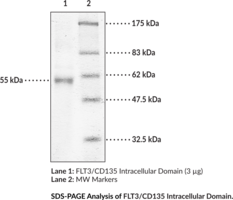Territorial Availability: Available through Bertin Technologies only in France
- Correlated keywords
- FLT-3 FLK-2 CD-135 STK-1 transphosphorylated BRIJ35 ZYLTE
- Product Overview:
FMS-like tyrosine kinase 3 (FLT3), also known as CD135, is a transmembrane cytokine receptor and member of the class III receptor tyrosine kinase family.{60916} It is composed of five extracellular immunoglobulin-like (Ig-like) domains, a transmembrane domain, an intracellular juxtamembrane domain, and two intracellular kinase domains. FLT3 is expressed in immature myeloid, lymphoid, and dendritic progenitor cells. Upon binding of FLT3 ligand, FLT3 forms a homodimer and the kinase domains are trans-phosphorylated, leading to activation of the RAS/MEK/ERK, PI3K, and STAT5A signaling pathways in a cell type-dependent manner.{60916,60917} It is involved in the growth, survival, and differentiation of hematopoietic cells. FLT3 is considered a protooncogene, and activating mutations in it are associated with shorter disease-free survival in patients with hematologic malignancies.{60916,60918} A mutation in FLT3 that results in an internal tandem duplication (ITD) of the juxtamembrane domain in FLT3 is found in approximately 20% of patients with acute myeloid leukemia (AML) and is associated with leukocytosis and poor prognosis.{60918,60919} Formulations containing inhibitors of FLT3 have been used in the treatment of AML but are associated with chemoresistance.{60917} Cayman’s FLT3/CD135 Intracellular Domain (human, recombinant) protein can be used for enzyme activity assays.
Cayman Chemical’s mission is to help make research possible by supplying scientists worldwide with the basic research tools necessary for advancing human and animal health. Our utmost commitment to healthcare researchers is to offer the highest quality products with an affordable pricing policy.
Our scientists are experts in the synthesis, purification, and characterization of biochemicals ranging from small drug-like heterocycles to complex biolipids, fatty acids, and many others. We are also highly skilled in all aspects of assay and antibody development, protein expression, crystallization, and structure determination.
Over the past thirty years, Cayman developed a deep knowledge base in lipid biochemistry, including research involving the arachidonic acid cascade, inositol phosphates, and cannabinoids. This knowledge enabled the production of reagents of exceptional quality for cancer, oxidative injury, epigenetics, neuroscience, inflammation, metabolism, and many additional lines of research.
Our organic and analytical chemists specialize in the rapid development of manufacturing processes and analytical methods to carry out clinical and commercial GMP-API production. Pre-clinical drug discovery efforts are currently underway in the areas of bone restoration and repair, muscular dystrophy, oncology, and inflammation. A separate group of Ph.D.-level scientists are dedicated to offering Hit-to-Lead Discovery and Profiling Services for epigenetic targets. Our knowledgeable chemists can be contracted to perform complete sample analysis for analytes measured by the majority of our assays. We also offer a wide range of analytical services using LC-MS/MS, HPLC, GC, and many other techniques.
Accreditations
ISO/IEC 17025:2005
ISO Guide 34:2009
Cayman is a leader in the field of emerging drugs of abuse, providing high-purity Schedule I-V Controlled Substances to federally-licensed laboratories and qualified academic research institutions for forensic analyses. We are certified by ACLASS Accreditation Services with dual accreditation to ISO/IEC 17025:2005 and ISO Guide 34:2009.





